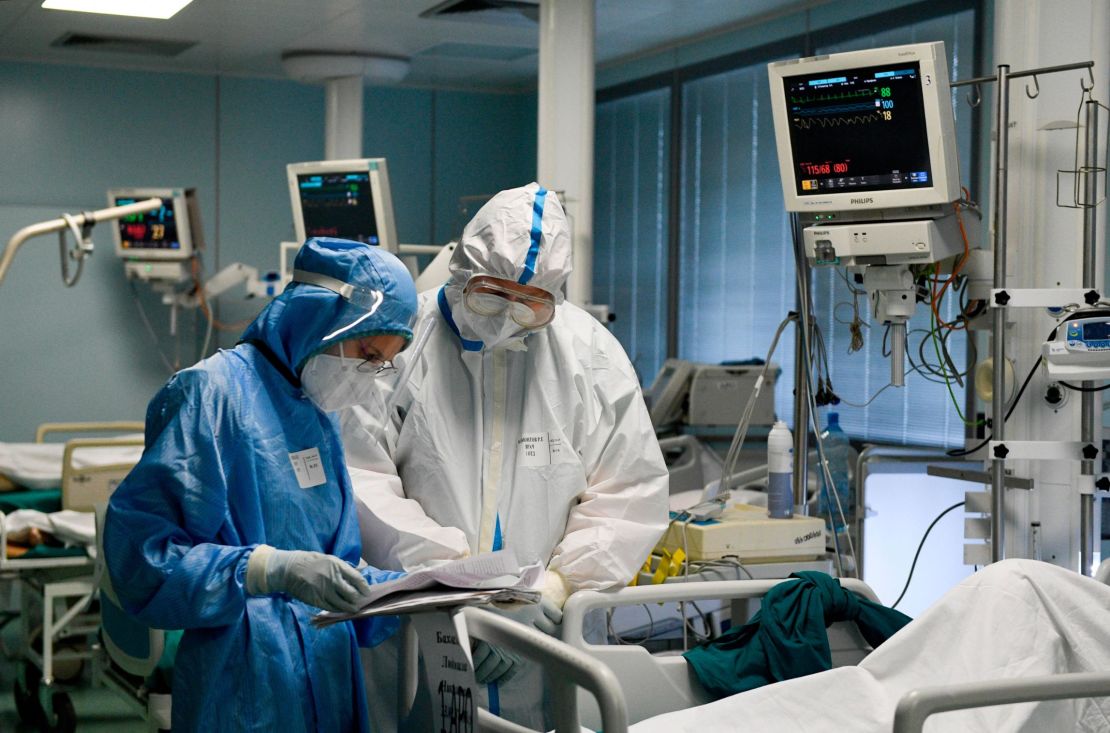The coronavirus situation in Russia remains “challenging but controllable,” President Vladimir Putin said Wednesday, as he urged regional governors not to “conceal” the real scale of the struggle with new infections continuing to surge.
“In some regions the situation is difficult, let’s put that plainly,” Putin said in a televised government meeting. “Relatively low numbers of infections in other regions should not calm us down as this could raise issues regarding the quality of detection.
“In no way should you try to sugar-coat the situation, it is unacceptable to pretend that everything is fine,” Putin added. “Nobody here or locally needs rosy reports and concealed [information].”
Putin has previously painted a rosier picture of how Russia is faring in the pandemic, insisting in June that the country’s leadership as a whole had managed to protect citizens from the coronavirus.
Russia’s counting methods for coronavirus-related fatalities have been long scrutinized by independent observers and critics who worry the numbers could be greatly understated. As of Wednesday, Russia had officially reported almost 2 million Covid-19 cases and 34,387 deaths.
A CNN investigation based on exclusively obtained videos showing appalling conditions in Russian hospitals and overcrowded morgues, as well as analysis of all-cause mortality data, revealed the real Covid-19 death toll in Russia may be as high as 130,000 casualties.
In recent weeks, Russia has experienced a surge of infections as the country reports new records in Covid-19 cases almost daily.
“Since October 1, the average daily infection rate across the country increased by 2.5 times, from 6.1 cases to 15.3 cases per 100,000 people,” Deputy Prime Minister Tatyana Golikova, who is responsible for Russia’s coronavirus response, said in the same meeting that Putin made his comments.
Across Russia, 81% of hospital beds allocated to coronavirus patients are occupied, with 10 regions reporting that they have exceeded 90% capacity, Golikova added.

Golikova also announced that Russia’s second coronavirus vaccine, EpiVacCorona, developed by the State Research Center of Virology and Biotechnology Vector in Novosibirsk, has already entered Phase 3 of clinical trials, which so far involves 3,000 participants. Vektor previously said it planned to enroll a total of 40,000 people for phase 3 trials and separately test the vaccine on groups of elderly people and children.
To date, Russia has registered two coronavirus vaccines ahead of large-scale Phase 3 trials, which are key to establish the product’s safety and efficacy, drawing skepticism from the international community.
Golikova said Russia was increasing the production of coronavirus vaccines to bring mass vaccination closer. According to her, 58,000 doses of Sputnik V, the first vaccine registered in Russia, have entered circulation among the general population since the vaccine was registered in mid-August.
“Timelines that are being submitted to us by production sites say that in November the plan is to introduce 653,000 doses of the vaccine into circulation among the general population and in December [that would be] 2.2 million doses,” Golikova said.
She did not specify who among the general population would receive the vaccine but Russia has previously said that frontline workers and teachers would be among the first to be vaccinated.
In addition to Sputnik V, EpiVacCorona will be supplied in small batches to Russia’s regions in the coming weeks, Golikova said.
“Vector without waiting for the results of post-registration clinical trials, began producing the vaccine for its introduction into civilian circulation,” Golikova said. “We expect that already small volumes will arrive by December 10 to inoculate the population of the Russian Federation.”
Golikova also reported that 79 out of 85 regions had followed the recommendation of Russia’s health regulator, Rospotrebnadzor, to close down bars and restaurants between 11 p.m. and 6 a.m. to help limit the spread of the virus.





